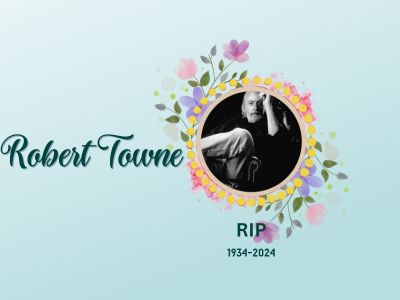Robert Towne is a celebrated American screenwriter and director. Born on November 23, 1934, in Los Angeles, California, Towne has significantly impacted the film industry. His work has influenced Hollywood and inspired many writers and filmmakers. This biography explores his life, career, and legacy in detail.
Robert Towne

Robert Towne was born Robert Bertram Schwartz. His parents, Lou and Helen Schwartz, were of Jewish descent. Growing up in Los Angeles, Towne was close to the heart of the American film industry. His father worked in the garment business, not directly connected to Hollywood, but the proximity to the film industry influenced Towne.
Education
He attended Pomona College, where he studied philosophy and English literature. This academic background helped him develop strong analytical and writing skills. These skills would later become the foundation of his successful career in screenwriting.
Entry into the Film Industry
Towne’s entry into the film industry began with his friendship with Roger Corman, a filmmaker known for his low-budget films. Corman gave Towne his first break by hiring him to write scripts for his movies. Towne’s early work included scripts for films such as “The Tomb of Ligeia” (1964) and “Last Woman on Earth” (1960). These projects helped Towne learn the craft of screenwriting and understand the film industry’s workings.
Breakthrough with “Chinatown”
Towne’s big break came in 1974 with the film “Chinatown.” Directed by Roman Polanski, “Chinatown” is considered one of the greatest screenplays ever written. Towne won the Academy Award for Best Original Screenplay for this film. The story, set in 1930s Los Angeles, revolves around a private detective, played by Jack Nicholson, who uncovers a web of corruption and deceit.
“Chinatown” showcased Towne’s ability to create complex characters and intricate plots. His writing was praised for its depth and originality. The film’s success established Towne as a leading screenwriter in Hollywood.
Continued Success in the 1970s and 1980s
Following the success of “Chinatown,” Towne continued to work on high-profile projects. He wrote the screenplay for “The Last Detail” (1973), starring Jack Nicholson, which earned him an Academy Award nomination. Towne also contributed to the screenplay for “Shampoo” (1975), a satirical look at the 1960s sexual revolution.
In the 1980s, Towne wrote and directed “Personal Best” (1982), a film about the lives of female athletes. Although it did not achieve commercial success, it was praised for its authentic portrayal of the sports world. Towne also wrote the screenplay for “Tequila Sunrise” (1988), a crime thriller starring Mel Gibson, Michelle Pfeiffer, and Kurt Russell.
Work on “Mission: Impossible”
In the 1990s, Towne contributed to the “Mission: Impossible” film series. He wrote the screenplay for the first film in the series, released in 1996. Directed by Brian De Palma and starring Tom Cruise, the film was a commercial success and led to a long-running franchise.
Towne’s involvement in the “Mission: Impossible” series continued with contributions to the second film, “Mission: Impossible II” (2000). His work on these films showcased his ability to write engaging action sequences and complex plots.
Later Career and Legacy
In the later years of his career, Towne continued to work on various film and television projects. He wrote and directed “Without Limits” (1998), a biographical film.
Teaching and Mentoring
Robert Towne has not only influenced the film industry through his work but also through his teaching and mentoring. He has shared his expertise with aspiring screenwriters and filmmakers, offering guidance and advice based on his extensive experience. Towne has taught screenwriting courses and workshops, emphasizing the importance of character development, plot structure, and dialogue.
Towne’s approach to teaching is rooted in his own experiences as a screenwriter. He encourages students to draw from their own lives and experiences to create authentic and relatable characters. He also stresses the importance of rewriting and refining scripts, a process he has always valued in his own work.
Challenges and Triumphs
Throughout his career, Robert Towne has faced various challenges. The film industry is notoriously difficult, and even the most talented individuals encounter obstacles. Towne’s career had its ups and downs, but his resilience and determination allowed him to overcome these challenges.
One notable challenge was the production of “Chinatown.” The film’s complex narrative and dark themes presented difficulties, but Towne’s collaboration with director Roman Polanski helped bring the vision to life. The success of “Chinatown” was a significant triumph for Towne, earning him critical acclaim and solidifying his reputation as a master screenwriter.
Impact on Modern Cinema
Robert Towne’s influence can be seen in modern cinema. Many contemporary screenwriters and directors cite Towne as an inspiration. His work on “Chinatown” is often studied in film schools for its exemplary screenplay. The film’s intricate plot and well-developed characters serve as a model for effective storytelling.
Towne’s contributions to the “Mission: Impossible” series also demonstrate his ability to adapt to changing trends in the film industry. The success of these films showed that Towne could write for different genres and audiences, further cementing his status as a versatile and talented screenwriter.
Contributions to Television
In addition to his work in film, Robert Towne has made contributions to television. He has written and directed episodes for various TV shows, bringing his storytelling skills to the small screen. His ability to craft engaging narratives and complex characters has translated well to television, earning him recognition in this medium as well.
Towne’s work in television includes writing for shows like “Mad Men,” where he brought his unique voice and perspective to the series. His involvement in television has allowed him to reach new audiences and continue his legacy as a master storyteller.
Philosophical and Literary Influences
Robert Towne’s background in philosophy and English literature has deeply influenced his work. His studies at Pomona College provided him with a strong foundation in critical thinking and analysis. These skills are evident in his screenplays, which often feature layered narratives and philosophical themes.
Towne’s interest in literature is also reflected in his adaptations of literary works. His screenplay for “Ask the Dust” demonstrates his ability to translate complex novels into compelling films. Towne’s literary influences have enriched his storytelling, adding depth and nuance to his characters and plots.
Collaborations with Other Filmmakers
Throughout his career, Robert Towne has collaborated with many notable filmmakers. His partnerships with directors like Roman Polanski, Brian De Palma, and Warren Beatty have resulted in some of his most successful projects. These collaborations have allowed Towne to bring his screenplays to life, benefiting from the vision and expertise of talented directors.
Towne’s ability to work effectively with others is a testament to his professionalism and dedication to his craft. His collaborative spirit has contributed to the success of many films, and his partnerships with other filmmakers have been mutually beneficial.
Personal Philosophy on Screenwriting
Robert Towne’s personal philosophy on screenwriting emphasizes the importance of authenticity and originality. He believes that the best stories come from genuine emotions and experiences. Towne encourages writers to dig deep into their own lives and to be honest in their storytelling.
Towne also values the process of rewriting and refining scripts. He believes that great screenplays are not written but rewritten. This philosophy has guided his own work and has been a key factor in his success as a screenwriter.
Influence on Future Generations
Robert Towne’s influence extends to future generations of writers and filmmakers. His work continues to be a source of inspiration and a benchmark for excellence in screenwriting. Aspiring screenwriters study his scripts to learn the craft and understand the elements of great storytelling.
Towne’s legacy is carried forward by those he has mentored and taught. His impact on the film industry will be felt for years to come, as new talents emerge and build upon the foundations that Towne has laid.
RIP Robert Towne
Robert Towne (1934-2024) Oskar winning superstar.
Conclusion
Robert Towne’s career is a remarkable journey of creativity and perseverance. From his early days in Los Angeles to his groundbreaking work on “Chinatown” and contributions to the “Mission: Impossible” series, Towne has left an indelible mark on the film industry. His dedication to storytelling, ability to create complex characters, and talent for crafting intricate plots have earned him a place among the greatest screenwriters of all time.
Towne’s influence is far-reaching, inspiring countless writers and filmmakers. His work serves as a reminder of the power of storytelling and the importance of authenticity in cinema. As Robert Towne’s legacy continues to inspire, his contributions to the art of screenwriting will be remembered and celebrated for generations to come.
You can also read about- Indian Institute of Vegetable Research (IIVR)

